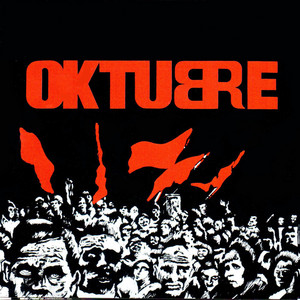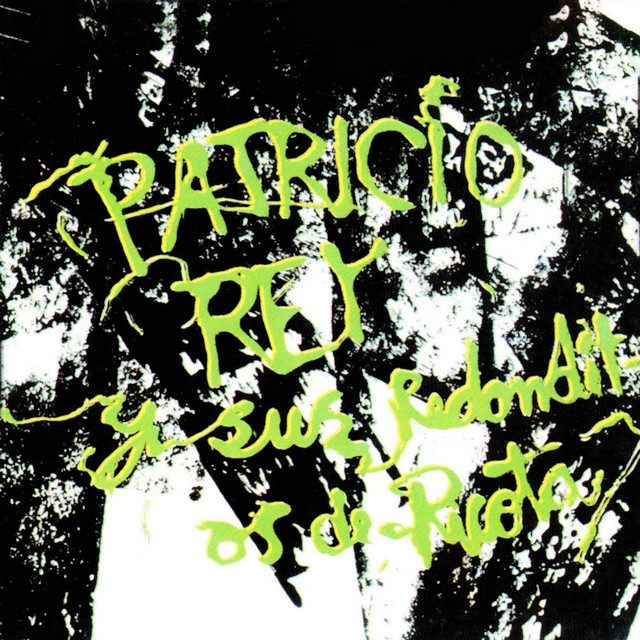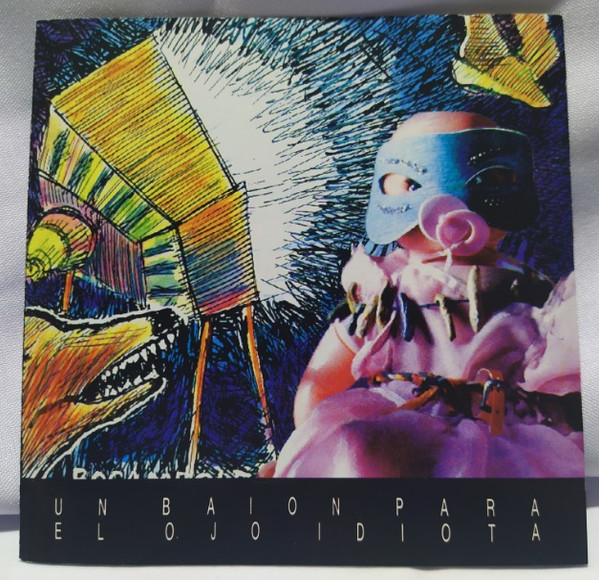
Rock and roll music
| Oktubre | ||||
|---|---|---|---|---|
 | ||||
| Studio album by | ||||
| Released | 4 October 1986 | |||
| Recorded | August–September 1985 Panda Studios, Buenos Aires | |||
| Genre | New wave Post-punk | |||
| Length | 41:08 | |||
| Label | Wormo Records Del Cielito | |||
| Producer | Patricio Rey | |||
| Patricio Rey y sus Redonditos de Ricota chronology | ||||
| ||||
Patricio Rey y sus Redonditos de Ricota - Fuegos de Octubre (Audio Oficial) · Channel: Patricio Rey y sus Redonditos de Ricota · 3m 38s


Patricio Rey y sus Redonditos de Ricota - Preso en mi Ciudad... · Channel: Patricio Rey y sus Redonditos de Ricota · 4m 4s

Patricio Rey y sus Redonditos de Ricota - Musica para Pastil... · Channel: Patricio Rey y sus Redonditos de Ricota · 4m 35s

Patricio Rey y sus Redonditos de Ricota - Semen-Up (Audio Of... · Channel: Patricio Rey y sus Redonditos de Ricota · 5m 22s

Patricio Rey y sus Redonditos de Ricota - Divina TV. Führer... · Channel: Patricio Rey y sus Redonditos de Ricota · 3m 2s

Patricio Rey y sus Redonditos de Ricota - Motor Psico (Audio... · Channel: Patricio Rey y sus Redonditos de Ricota · 4m 57s

Patricio Rey y sus Redonditos de Ricota - Jijiji (Audio Ofic... · Channel: Patricio Rey y sus Redonditos de Ricota · 5m 35s

Patricio Rey y sus Redonditos de Ricota - Cancion para Naufr... · Channel: Patricio Rey y sus Redonditos de Ricota · 6m 2s

Patricio Rey y sus Redonditos de Ricota - Ya Nadie va a Escu... · Channel: Patricio Rey y sus Redonditos de Ricota · 3m 59s
Oktubre
Los Redonditos de Ricota
Discográfica: Wormo RecordsDel Cielito · · Productor: Patricio Rey
From Wikipedia, the free encyclopedia
Leer más
Review
From Wikipedia, the free encyclopedia
Leer más
1986 studio album by Patricio Rey y sus Redonditos de Ricota
Oktubre is the second studio album by Argentine rock band Patricio Rey y sus Redonditos de Ricota, released in 1986.[1][2] It is the band`s last album to feature to Piojo Ávalos, Tito D`Aviero and Willy Crook as band members, who left the band after the tour between late 1986 and early 1987. In 2007, the Argentine edition of Rolling Stone ranked it fourth on its list of "The 100 Greatest Albums of National Rock".[3]
Background
The album cover and its concept are inspired by the 1917 October Revolution, while the sound incorporates elements of post-punk influence in the 1980s New wave imposed by groups such as The Cure, Joy Division and The Police. The band garnered some airplay with "Jijiji" and "Ya nadie va a escuchar tu remera" and, as a result, Patricio Rey pursued a more melodic, radio friendly direction on their future albums.
Oktubre was officially released on 4 October 1986 and its presentation took place on 18 and 25 October at Paladium in front of 1200 fans. Keyboardist Andrés Teocharidis participated in both shows. Some CD bootlegs from these shows were released with Teocharidis, being his only contribution to the band due to his death in a car accident in early 1987.
Hailed by both critics and fans as the band`s masterwork, the album contains some of the Patricio Rey`s signature songs, such as "Jijiji", "Ya nadie va a escuchar tu remera", "Fuegos de octubre" and "Motor Psico".
Cover
The cover art was designed by Ricardo Rocambole Cohen.
It is a more conceptual cover. The ideas were conceived on a Fernet night: Indio saw flags, crowds. At first it was to be all red and black, but then I added gray when I remade it in a more abstract manner. An mirrored letter gives the typography a Soviet feel. On the back cover you can see the La Plata cathedral on fire: a symbol of revolution. I find it strange to see my work on t-shirts and tattoos: people have appropriated things such as the fist and chain, which were made in 15 minutes for an ad. At Paladium, I personified Patricio Rey with an old pair of glasses.
— Rocambole[4]
To the right side, Che Guevara`s face can be distinguished.[4]
Track listing
- All songs written by Solari/Beilinson.
| No. | Title | Length |
|---|---|---|
| 1. | "Fuegos de Octubre [October Fires]" | 3:42 |
| 2. | "Preso en mi ciudad [Prisoner in my city]" | 4:02 |
| 3. | "Música para pastillas [Music for pills]" | 4:35 |
| 4. | "Semen-Up" | 5:22 |
| 5. | "Divina TV Führer [Divine Tv Führer]" | 3:03 |
| 6. | "Motor psico [Psycho engine]" | 4:57 |
| 7. | "Jijiji" | 5:25 |
| 8. | "Canción para naufragios [Shipwrecks Song]" | 6:02 |
| 9. | "Ya nadie va a escuchar tu remera [Nobody will listen to your shirt anymore]" | 3:59 |
Personnel
Patricio Rey
- Indio Solari - Vocals.
- Skay Beilinson - Lead guitar.
- Tito "Fargo" D`Aviero - Rhythm guitar.
- Semilla Bucciarelli - Bass guitar.
- Piojo Avalos - Drums.
- Willy Crook - Saxophone.
Guests
- Daniel Melero - Keyboards.
- Claudio Cornelio - Percussion.
Additional personnel
- Osvel Costa - Engineer.
- Ricardo "Rocambole" Cohen - Cover & Art.
- Poli - Executive producer.
From Wikipedia, the free encyclopedia
1986 studio album by Patricio Rey y sus Redonditos de Ricota
Oktubre is the second studio album by Argentine rock band Patricio Rey y sus Redonditos de Ricota, released in 1986.[1][2] It is the band`s last album to feature to Piojo Ávalos, Tito D`Aviero and Willy Crook as band members, who left the band after the tour between late 1986 and early 1987. In 2007, the Argentine edition of Rolling Stone ranked it fourth on its list of "The 100 Greatest Albums of National Rock".[3]
Background
The album cover and its concept are inspired by the 1917 October Revolution, while the sound incorporates elements of post-punk influence in the 1980s New wave imposed by groups such as The Cure, Joy Division and The Police. The band garnered some airplay with "Jijiji" and "Ya nadie va a escuchar tu remera" and, as a result, Patricio Rey pursued a more melodic, radio friendly direction on their future albums.
Oktubre was officially released on 4 October 1986 and its presentation took place on 18 and 25 October at Paladium in front of 1200 fans. Keyboardist Andrés Teocharidis participated in both shows. Some CD bootlegs from these shows were released with Teocharidis, being his only contribution to the band due to his death in a car accident in early 1987.
Hailed by both critics and fans as the band`s masterwork, the album contains some of the Patricio Rey`s signature songs, such as "Jijiji", "Ya nadie va a escuchar tu remera", "Fuegos de octubre" and "Motor Psico".
Cover
The cover art was designed by Ricardo Rocambole Cohen.
It is a more conceptual cover. The ideas were conceived on a Fernet night: Indio saw flags, crowds. At first it was to be all red and black, but then I added gray when I remade it in a more abstract manner. An mirrored letter gives the typography a Soviet feel. On the back cover you can see the La Plata cathedral on fire: a symbol of revolution. I find it strange to see my work on t-shirts and tattoos: people have appropriated things such as the fist and chain, which were made in 15 minutes for an ad. At Paladium, I personified Patricio Rey with an old pair of glasses.
— Rocambole[4]
To the right side, Che Guevara`s face can be distinguished.[4]
Track listing
- All songs written by Solari/Beilinson.
| No. | Title | Length |
|---|---|---|
| 1. | "Fuegos de Octubre [October Fires]" | 3:42 |
| 2. | "Preso en mi ciudad [Prisoner in my city]" | 4:02 |
| 3. | "Música para pastillas [Music for pills]" | 4:35 |
| 4. | "Semen-Up" | 5:22 |
| 5. | "Divina TV Führer [Divine Tv Führer]" | 3:03 |
| 6. | "Motor psico [Psycho engine]" | 4:57 |
| 7. | "Jijiji" | 5:25 |
| 8. | "Canción para naufragios [Shipwrecks Song]" | 6:02 |
| 9. | "Ya nadie va a escuchar tu remera [Nobody will listen to your shirt anymore]" | 3:59 |
Personnel
Patricio Rey
- Indio Solari - Vocals.
- Skay Beilinson - Lead guitar.
- Tito "Fargo" D`Aviero - Rhythm guitar.
- Semilla Bucciarelli - Bass guitar.
- Piojo Avalos - Drums.
- Willy Crook - Saxophone.
Guests
- Daniel Melero - Keyboards.
- Claudio Cornelio - Percussion.
Additional personnel
- Osvel Costa - Engineer.
- Ricardo "Rocambole" Cohen - Cover & Art.
- Poli - Executive producer.


















